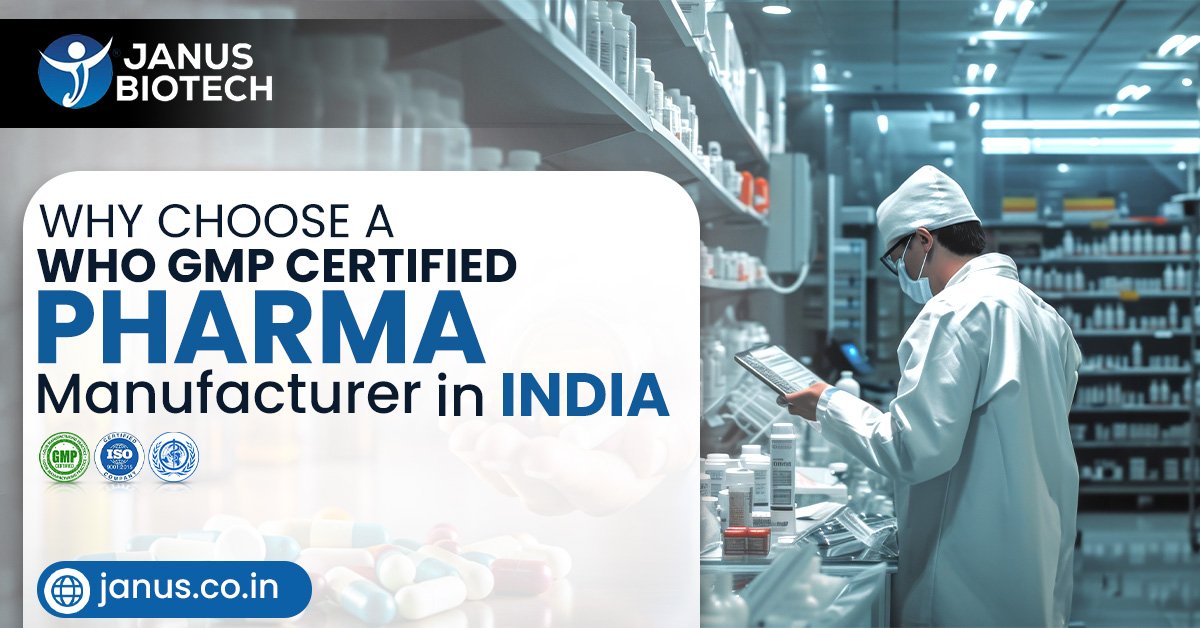The Indian pharmaceutical industry totally depends on the health of its people. Having faith in medicines being safe, effective, and of good quality is essentially what this entire sector is all about. For that reason, it’s absolutely essential to have a WHO GMP certified pharma manufacturer. Essentially, this set of rules ensures that medicines are produced and tested every now & then so that they can be guaranteed to be of quality. In India, this certification has become extremely crucial since the nation has a booming international pharma industry. Did you know that India produces more than 60% of the vaccines supplied globally? That just goes to show there’s an enormous demand for quality GMP-certified producers! Moreover, the Indian pharma industry had crossed ₹3.3 lakh crore in 2025, and those WHO-GMP factories really contributed to that!
Utilised either “exported” or “domestically”, doing so with a capable manufacturer ensures quality, safety, and integrity. Moreover, it not only reaches foreign markets but also establishes itself as a credible brand name with distributors and regulatory authorities.
Why Choose a WHO GMP certified pharma manufacturer in India
Ensures Consistency and Product Integrity
A pharma manufacturer WHO GMP certified must adhere to certain manufacturing rules. Each batch produced under this certification maintains uniformity as far as composition, strength, and purity are concerned. As a result, this consistency enhances patient safety and confidence.
Also, when processes are validated with the right checks, it means every step from raw material to the finished product gets a solid check-up. Moreover, this cuts down on batch rejections and helps speed up those regulatory approvals. Businesses that maintain this level of excellence in a cutthroat industry truly stand out.
Improves Global Market Accessibility
GMP certification is like your golden ticket to the big leagues of international markets. Countries like the USA, UK, and Germany prefer to purchase from WHO GMP certified pharma manufacturers. Hence, it opens up a lot of export opportunities for you.
Indian WHO-GMP-compliant business houses also extend invitations to multinationals for contract manufacturing deals or outsourcing. So, it is not reputation; it is a business strategy at a global level.
Reduces Operational and Legal Risks
GMP compliance reduces contamination, cross-mixing, and other quality defects. Hence, this reduces the risk of recalls, fines, or product liability lawsuits.
Also, with India’s tightening regulatory climate, a WHO GMP certified pharma manufacturer is insurance against unexpected compliance problems for your brand. This foresight saves time and money.
Support Sustainable and Ethical Practices
WHO-GMP approved manufacturers ensure waste disposal, do operations in clean rooms, and train staff. All of these environmental & ethical practices have a significant effect on the world of environmental consciousness today.
Sustainability is now considered by national and global pharma buyers, and hence this certification is twice as useful for forward-thinking operations.
Choosing a Reliable WHO GMP Certified Pharma Contract Manufacturer Offers Many Advantages
• A WHO GMP compliant pharma contract manufacturing company provides total documentation—COAs, batch records, stability data—pursuant to Indian as well as international regulatory guidelines. The submission and audit procedures are transparent and efficient.
• These licensed producers usually have modern, automated facilities with sophisticated R&D laboratories. They conduct product development, stability testing, & formulation research in one facility.
• These producers have strong QA infrastructures, frequent SOP updates, and constant monitoring. Hence, this offers high process accuracy and clean, traceable manufacturing streams. Validation ensures that all batches are replicable, a very important feature while producing simple and composite drugs.
• WHO-GMP plants in India have a competitive cost of production because they have cheap raw materials and skilled manpower. But they have international quality. This mix is beneficial to mass production and economization. As demand grows, firms are more than happy to expand capacity with strict adherence.
• A WHO GMP certified pharma manufacturer and are already on par with global standards. As a result, consumers in regulated and semi-regulated marketplaces register more quickly. Hence, this accelerates product launches and increases global availability.
Long-Term Advantages with a WHO GMP Certified Pharma Contract Manufacturer
When you work with a pharma contract manufacturer who is WHO GMP approved, you can expect solid long-term quality and value. Such a union not only gives you products but some shrewd strategic advantages as well. They possess adaptable manufacturing agreements for every type of thing—like injectables, tablets, nutraceuticals & herbal medicines. And pharma companies engaged in PCD pharma or institutional supply possess good product quality that truly lives up to their brand promise.
Moreover, WHO GMP certified pharma contract manufacturer prefers to invest in keeping the technology current, using ERP systems, and training staff. Therefore, customers are kept updated about product quality, innovation, and adherence to market norms.
Final Thoughts
Selecting a WHO GMP certified pharma manufacturer isn’t merely a matter of checking the compliance box. It shows that you truly care about the safety, quality, and correctness of your products. Moreover, with regulations getting tighter across the board, obtaining this certification gives your company an enormous amount of credibility.
If you are a firm looking to outsource some solid and reliable manufacturing, Janus Biotech is definitely one name you can rely upon in India. They have a WHO-GMP approved plant and cutting-edge R&D laboratories, so Janus Biotech is an excellent manufacturer in India.
Frequently Asked Questions
Q1. What does WHO-GMP certification mean for Indian pharma manufacturing?
It suggests that the company follows WHO-recommended sanitation and quality control procedures in addition to the best manufacturing practices available.
Q2. Why is WHO-GMP important for pharma exports from India?
WHO-GMP certification for the export of Indian medicines is required by the majority of countries to facilitate easy entry into regulated markets by the exporters.
Q3. How does a WHO-GMP certified manufacturer reduce legal risks?
They follow strict quality protocols, reducing product recalls, contamination, or regulatory violations & hence reducing scope for legal penalties.


